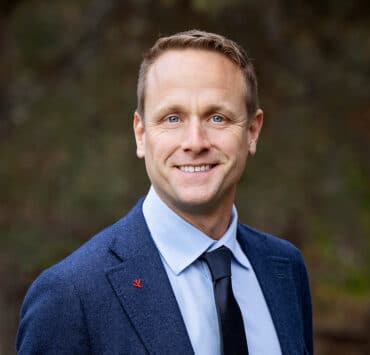Mark Coticchia has spent his three decade-plus career building and managing complex teams to help organizations execute deals and transactions as well as monetize intellectual assets. Now, he is helping Baptist Health South Florida launch and grow an innovation business unit with capabilities second to none in the health innovation industry.
An industrial and civil engineer by training, Coticchia joined Baptist Health South Florida as its first-ever corporate vice president of innovation in 2019. Over the past several years, he has established and advanced an innovation group that is garnering national recognition for the healthcare system, which is made up of more than twenty-six thousand employees and four thousand physicians. Coticchia’s work involves building and commercializing new products and services based on the system’s commitment to setting the global standard in patient care.
“More than ever, clinicians and administrators are looking for a way to improve patient care and sustain those improvements over time,” he says. “Hospital leaders get pretty excited. In terms of economic return, we help hospital systems monetize the vast amount of know-how in their institutions.”
Coticchia advances healthcare innovation by commercializing research results, medical inventions, data, and know-how in a very pragmatic way. Thus far, his relatively new innovation program at Baptist Health has generated licensing income and foundation support, consummated dozens of deals and collaborations, and engaged hundreds of physicians and employees in their innovation process, he says. He adds that having the right people in place has sped the entire endeavor along a shorter-than-usual timeline.
“We’re committed to our patients and our region, and we help export our local success to the globe.”
Mark Coticchia
“I’m all about process, capturing know-how and advancing it obsessively into the patient environment for improved care,” he explains. “I start with the problem first and say, ‘how can I get together the people who are subject matter experts from inside and outside the system to solve the wicked problems, the challenges we face?’”
He came to the role with a strong track record of launching technology companies and generating top-quartile financial returns as both the director of technology transfer at Carnegie Mellon University and vice president for research, technology management, and economic development at Case Western Reserve University. He has also served as chief innovation officer at Henry Ford Health, where he established an innovation business unit for the thirty thousand-employee system.
“I’ve made progress entirely because I have had the privilege of working in environments with highly skilled physicians, researchers, and others, and I could recognize and advance the brilliance and importance of their ideas,” Coticchia reflects.
The VP has participated in and led hundreds of commercial deals of all stripes, types, and sizes and describes himself as a “creative dealmaker.” Some deals that typify his career include: intellectual property licensing arrangements with Aldara Hospital and Medical Center in Saudi Arabia and Naruvi Hospitals in India, both of which are bringing a significant future income stream to Henry Ford Health; Lycos, started at Carnegie Mellon and touted as the then-fastest-ever “startup-to-IPO,” was monetized to benefit the University’s programs; CASurgica and Carnegie Learning, both of which started at Carnegie Mellon and contributed economically to the university mission; CardioInsight, a non-invasive mapping system, started at Case Western Reserve University until its acquisition by Medtronic; and numerous other startups that both contributed to society and generated new revenue streams to the universities and hospital systems Coticchia served.
Coticchia says he draws upon the totality of his previous experience when developing new programs that capture and leverage intellectual property assets by converting those into new revenue streams and ensuring the resulting products and services help society.
“As I built and led programs and teams, I took lessons from what did and didn’t work and built a program that was right for Baptist Health,” he recalls. “Time and resource challenges keep things interesting in my world. My satisfaction comes from when we overcome a myriad of barriers and create success in spite of the obstacles.”
He’s spent decades developing a playbook—an operational infrastructure designed to promote innovation mindsets across systems. It draws on his expertise in spinning off companies, doing deals, developing industry collaborations, working as a venture capital partner, and serving as a longtime speaker and advisor. It starts with bringing together an experienced, high-performing team and doing the business development work to connect hospitals with communities and corporations. Then, the playbook moves on to licensing knowledge and making deals.
“We’re adept at not-for-profit laws, rules, regulations and policies to structure licensing and other types of deals that contribute economically to the institutional mission,” he says. “We are experts in licensing deals that involve clinical and operational data; basically, we specialize in leveraging data and know-how to benefit healthcare communities.”
“Our goal is to engineer a better future for healthcare, and I’m proud we have established a world-class innovation program at Baptist Health.”
Mark Coticchia
Harnessing data proficiently, whether in databases or human minds, plays an important role in informing hospital decisions. “The people who work in healthcare systems all day every day are the most overlooked intellectual assets in the healthcare profession,” he asserts, adding that healthcare system leaders and the thousands of associates who work in the systems need to share a similar growth mindset. “Necessity is the mother of invention—to grow, to improve, and to create new ways of doing things. It’s essentially a creative mindset, a continuous improvement mindset. They feel it in their bones and see it in their revenues.”
Coticchia and his team believe it’s important to provide the Baptist Health innovations expertise and Baptist Health assets to an international marketplace. “We’re committed to our patients and our region, and part of that entails gaining from the export of our capabilities to the globe,” he says. As such, they’ve set up operations to design, build, and operate medical facilities in other parts of the world. He says, “Our goal is to engineer a better future for healthcare, and I’m proud we have established a world-class innovation program at Baptist Health.”
Meanwhile, Coticchia believes the biggest takeaway for others seeking to grow innovation in their own healthcare environment is that data and know-how are huge, untapped opportunities.
“Healthcare system leaders focus on research results and de novo invention. I think the bigger opportunity for improvement in patients’ lives lies in the operational and clinical know-how that healthcare systems have,” he says. “It’s overlooked, but each healthcare system has unique approaches, and each healthcare system has an element of diversity that can be harnessed by companies to develop new products and services for advancing human health.”


